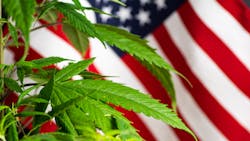Every few years, travel writer and PBS show host Rick Steves embarks on what he calls a “barnstorming tour,” traveling through the country to advocate for what he calls a “pragmatic” approach to cannabis. The events tend to be small and conversational, but they’ve made a big impact. On Wednesday night he was at Boston’s sleek UMass Club, addressing a crowd of several dozen.
Steves, a board member of NORML, has pushed for legalization for decades. But the cheery 61-year-old is quick to call out a distinction in his support: While he wants legalization for cannabis to move forward, he’s not what he calls “pro-pot.”
“I advocate for the civil liberty of smoking pot,” he told the room during his speech. “I’m driven by civil liberties … and you have to be committed to civil liberties if we’re going to enjoy the freedoms we often take for granted.”
Four years ago he was in Washington, encouraging voters to support I-502, the country’s first law, along with Colorado’s, to legalize adult-use cannabis at the state level. Two years later he showed up in Oregon, which would go on to pass its own adult-use measure. “This year, I talked to my friends at NORML and asked where I can spend my time and money best,” he told Leafly in an interview.
“They said Maine and Massachusetts, and so I’m here.”
“Your legislators don’t have the courage to learn about it.”
Steves is in town as part of a statewide canvassing effort in support of Question 4 in Massachusetts, which would allow adults 21 and older to possess and use cannabis. Individuals could cultivate the plant at home, and commercially grown marijuana would be regulated and taxed.
“I’ve been doing this for 10 years, and anytime there’s an initiative to tax, regulate, and legalize marijuana in a public-safety way, I’m all over it,” Steves said.
He told the crowd that he’s noticed a disconnect between the cannabis conversation on the East Coast and what he’s used to where he’s from, in Washington state.
In Massachusetts, Boston Mayor Marty Walsh, Gov. Charlie Baker, House Speaker Robert DeLeo, and Attorney General Maura Healey have been vocal opponents of legalization. They’ve argued that cannabis is a “gateway drug” and have warned that legalization would increase teen use of cannabis and could worsen the state’s opioid epidemic. None of those claims is supported by available evidence, and some are directly refuted by it.
“Your legislators don’t have the courage to learn about [cannabis],” Steves told the crowd, motioning to the golden dome of the Massachusetts State House, situated within eyeshot of the venue.
Even securing a location for the event in Boston was difficult, Steves said, given how nervous mainstream organizations, legislators, and businesses have been about handling the topic. “On the West Coast, I talk to churches, Rotary clubs, and so on, and it’s great,” he said. In Massachusetts, on the other hand, “it’s hard to even get anyone to give us a venue.”
Talking to pro-cannabis votes, who made up the bulk of Wednesday night’s crowd, is “not going to accomplish as much as talking to a bunch of anti-cannabis people,” he told Leafly, “but anti-cannabis organizations don’t even want to let me in through the door.”
Much of Steves’s talk focused on undoing the prohibitionist propaganda still driving much of cannabis policy today. He said the key to moving the needle nationally is to take the crime out of the equation entirely. “My bottom line is, stop arresting pot smokers.”
A report released Wednesday by the ACLU and Human Rights Watch found that on any given day in the US, at least 137,000 people are in prison on simple cannabis and drug-possession charges. Antiquated laws ensuring cannabis possession or use will lead to jail time are one of the biggest blights on the criminal justice system—and one of the biggest obstacles to reform.
“It’s a great way to disenfranchise people, but also lock black people up,” he said to the crowd. “Rich white guys don’t get arrested.”
Numerous times throughout the event, Steves described what he’s seen Washington and other legal states, such as Colorado. Lawmakers and voters, he said, need to think in terms of 2016—not 2010.
“In 2010, I could understand politicians being skeptical,” he told the crowd. “They were wired by all the government propaganda about how we’re supposed to think about legal cannabis,” namely that it would be an upredictable disaster, that legal markets had no established track record, and that supporters were just going on hunches.
“The hunches of those of us that pushed for legalization four years ago in Washington and Colorado have panned out the way we thought they would,” he went on, “and now we have a track record. But there’s still people saying, ‘But what’s going to happen if we legalize pot?’ We know what’s going to happen. Nothing! You’re just going to take a black market and legalize it and tax the hell out of it.
“Washington and Colorado are pulling in an extra $130 million a year in extra tax revenue, and it’s not coming out of people’s pockets,” he said, referring to the fact that retail prices are generally lower than illegal cannabis once was. “It’s coming from the black market, gangs, and organized crime.”
“Once California goes, I think this whole prohibition conversation will come tumbling down,” he added, pointing to studies suggesting that tax revenues from fully legal cannabis could bring the state billions of dollars. Considering the state’s GDP is bigger than France’s, that’s not an outlandish prediction.
Preaching to a choir of supporters is par for the course when it comes to the slow-to-adopt East Coast mentality around cannabis legalization, Steves said, but that’s not all he’s doing in Massachusetts. “I’m preaching to the choir in my events, but I’m getting into the media, which is not the choir at all,” he said.
Coverage of his talks results in greater exposure, which allows him to reach ears and eyes even in a state where he has trouble finding an event space. “We couldn’t’ get any [non-cannabis] organizations to sponsor an educational event about cannabis,” he said, “but we’re getting a lot of earned media. Which makes it all worthwhile.”
Correction: An version of this story misstated Rick Steves’s age. He is 61.





